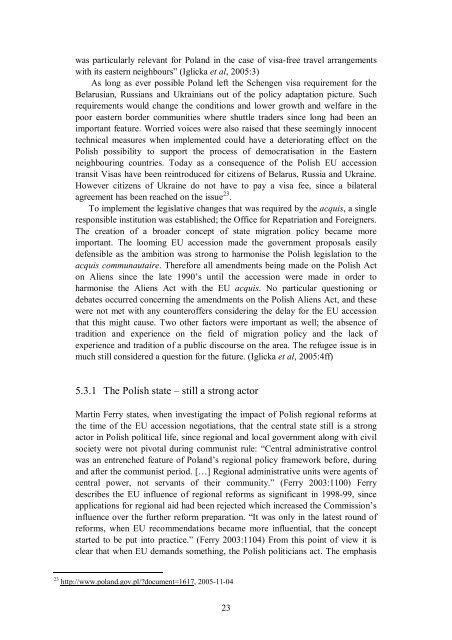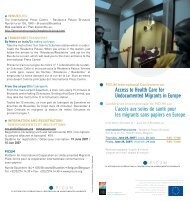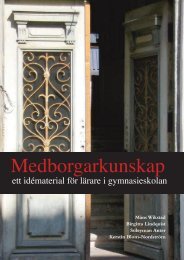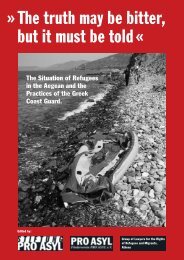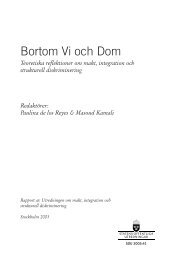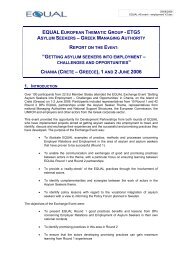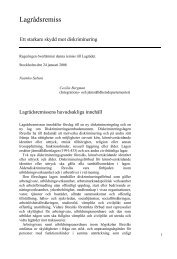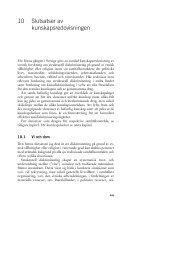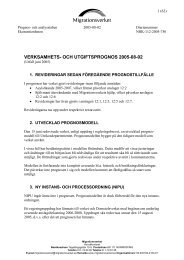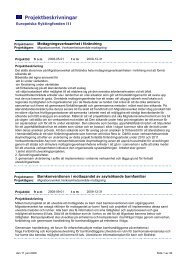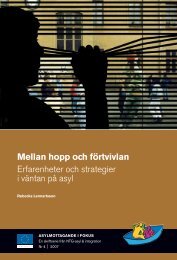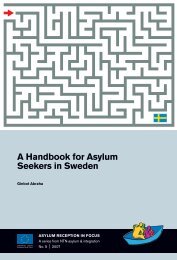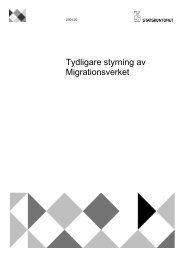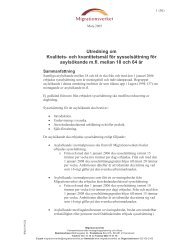The Common European Asylum System in Poland - Tema asyl ...
The Common European Asylum System in Poland - Tema asyl ...
The Common European Asylum System in Poland - Tema asyl ...
Create successful ePaper yourself
Turn your PDF publications into a flip-book with our unique Google optimized e-Paper software.
was particularly relevant for <strong>Poland</strong> <strong>in</strong> the case of visa-free travel arrangements<br />
with its eastern neighbours” (Iglicka et al, 2005:3)<br />
As long as ever possible <strong>Poland</strong> left the Schengen visa requirement for the<br />
Belarusian, Russians and Ukra<strong>in</strong>ians out of the policy adaptation picture. Such<br />
requirements would change the conditions and lower growth and welfare <strong>in</strong> the<br />
poor eastern border communities where shuttle traders s<strong>in</strong>ce long had been an<br />
important feature. Worried voices were also raised that these seem<strong>in</strong>gly <strong>in</strong>nocent<br />
technical measures when implemented could have a deteriorat<strong>in</strong>g effect on the<br />
Polish possibility to support the process of democratisation <strong>in</strong> the Eastern<br />
neighbour<strong>in</strong>g countries. Today as a consequence of the Polish EU accession<br />
transit Visas have been re<strong>in</strong>troduced for citizens of Belarus, Russia and Ukra<strong>in</strong>e.<br />
However citizens of Ukra<strong>in</strong>e do not have to pay a visa fee, s<strong>in</strong>ce a bilateral<br />
agreement has been reached on the issue 23 .<br />
To implement the legislative changes that was required by the acquis, a s<strong>in</strong>gle<br />
responsible <strong>in</strong>stitution was established; the Office for Repatriation and Foreigners.<br />
<strong>The</strong> creation of a broader concept of state migration policy became more<br />
important. <strong>The</strong> loom<strong>in</strong>g EU accession made the government proposals easily<br />
defensible as the ambition was strong to harmonise the Polish legislation to the<br />
acquis communautaire. <strong>The</strong>refore all amendments be<strong>in</strong>g made on the Polish Act<br />
on Aliens s<strong>in</strong>ce the late 1990’s until the accession were made <strong>in</strong> order to<br />
harmonise the Aliens Act with the EU acquis. No particular question<strong>in</strong>g or<br />
debates occurred concern<strong>in</strong>g the amendments on the Polish Aliens Act, and these<br />
were not met with any counteroffers consider<strong>in</strong>g the delay for the EU accession<br />
that this might cause. Two other factors were important as well; the absence of<br />
tradition and experience on the field of migration policy and the lack of<br />
experience and tradition of a public discourse on the area. <strong>The</strong> refugee issue is <strong>in</strong><br />
much still considered a question for the future. (Iglicka et al, 2005:4ff)<br />
5.3.1 <strong>The</strong> Polish state – still a strong actor<br />
Mart<strong>in</strong> Ferry states, when <strong>in</strong>vestigat<strong>in</strong>g the impact of Polish regional reforms at<br />
the time of the EU accession negotiations, that the central state still is a strong<br />
actor <strong>in</strong> Polish political life, s<strong>in</strong>ce regional and local government along with civil<br />
society were not pivotal dur<strong>in</strong>g communist rule: “Central adm<strong>in</strong>istrative control<br />
was an entrenched feature of <strong>Poland</strong>’s regional policy framework before, dur<strong>in</strong>g<br />
and after the communist period. […] Regional adm<strong>in</strong>istrative units were agents of<br />
central power, not servants of their community.” (Ferry 2003:1100) Ferry<br />
describes the EU <strong>in</strong>fluence of regional reforms as significant <strong>in</strong> 1998-99, s<strong>in</strong>ce<br />
applications for regional aid had been rejected which <strong>in</strong>creased the Commission’s<br />
<strong>in</strong>fluence over the further reform preparation. “It was only <strong>in</strong> the latest round of<br />
reforms, when EU recommendations became more <strong>in</strong>fluential, that the concept<br />
started to be put <strong>in</strong>to practice.” (Ferry 2003:1104) From this po<strong>in</strong>t of view it is<br />
clear that when EU demands someth<strong>in</strong>g, the Polish politicians act. <strong>The</strong> emphasis<br />
23 http://www.poland.gov.pl/?document=1617, 2005-11-04<br />
23


